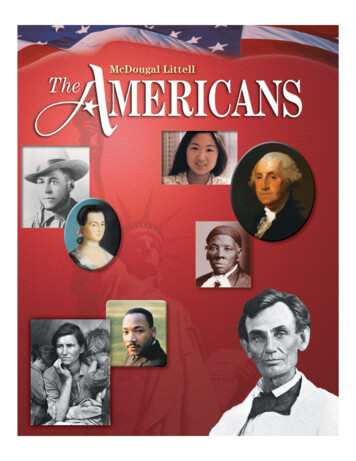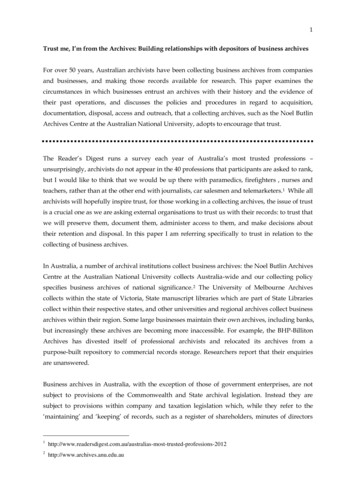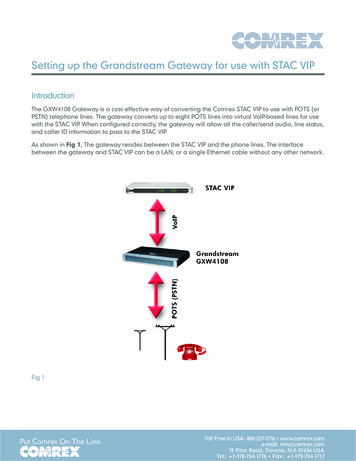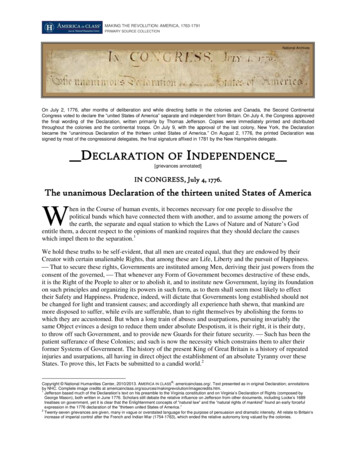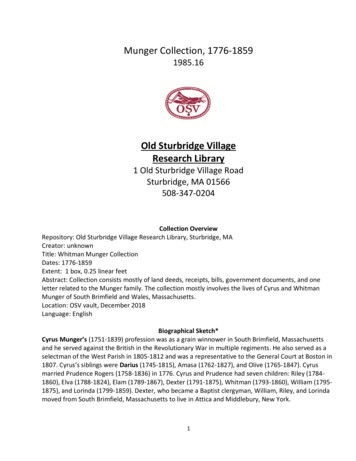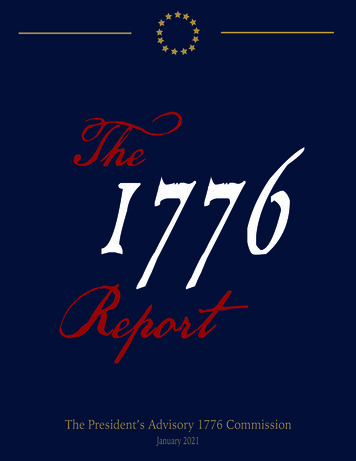
Transcription
1776TheReportThe President’s Advisory 1776 CommissionJanuary 2021
TABLE OF CONTENTSI.Introduction . 1II.The meaning of the declaration. 2III. A constitution of principles . 6IV. Challenges to America’s Principles . 10Slavery. 10Progressivism . 12Fascism . 13Communism . 14Racism and Identity Politics . 15V.The Task of National Renewal . 16The Role of the Family . 17Teaching America . 17A Scholarship of Freedom. 18The American Mind . 18Reverence for the Laws . 19VI. CONCLUSION. 20Appendix I: The declaration of independence.21Appendix II: Faith and America’s Principles . 24Appendix III: Created Equal or Identity Politics?. 29Appendix IV: Teaching Americans about Their Country . 34The 1776 report
I.INTRODUCTIONIn the course of human events there have always beenthose who deny or reject human freedom, butAmericans will never falter in defending thefundamental truths of human liberty proclaimed on July4, 1776. We will—we must—always hold these truths.facts of our nation’s founding. Properly understood,these facts address the concerns and aspirations ofAmericans of all social classes, income levels, races andreligions, regions and walks of life. As well, these factsprovide necessary—and wise—cautions againstunrealistic hopes and checks against pressing partisanclaims or utopian agendas too hard or too far.The declared purpose of the President’s Advisory 1776Commission is to “enable a rising generation tounderstand the history and principles of the founding ofthe United States in 1776 and to strive to form a moreperfect Union.” This requires a restoration of Americaneducation, which can only be grounded on a history ofthose principles that is “accurate, honest, unifying,inspiring, and ennobling.” And a rediscovery of ourshared identity rooted in our founding principles is thepath to a renewed American unity and a confidentAmerican future.The Commission’s first responsibility is to produce areport summarizing the principles of the Americanfounding and how those principles have shaped ourcountry. That can only be done by truthfullyrecounting the aspirations and actions of the men andwomen who sought to build America as a shining “cityon a hill”—an exemplary nation, one that protects thesafety and promotes the happiness of its people, as anexample to be admired and emulated by nations of theworld that wish to steer their government towardgreater liberty and justice. The record of our founders’striving and the nation they built is our sharedinheritance and remains a beacon, as Abraham Lincolnsaid, “not for one people or one time, but for all peoplefor all time.”Washington Crossing the DelawareEmanuel LeutzeThe principles of the American founding can be learnedby studying the abundant documents contained in therecord. Read fully and carefully, they show how theAmerican people have ever pursued freedom andjustice, which are the political conditions for livingwell. To learn this history is to become a better person,a better citizen, and a better partner in the Americanexperiment of self-government.Today, however, Americans are deeply divided aboutthe meaning of their country, its history, and how itshould be governed. This division is severe enough tocall to mind the disagreements between the colonistsand King George, and those between the Confederateand Union forces in the Civil War. They amount to adispute over not only the history of our country but alsoits present purpose and future direction.Comprising actions by imperfect human beings, theAmerican story has its share of missteps, errors,contradictions, and wrongs. These wrongs have alwaysmet resistance from the clear principles of the nation,and therefore our history is far more one of selfsacrifice, courage, and nobility. America’s principlesare named at the outset to be both universal—applyingto everyone—and eternal: existing for all time. Theremarkable American story unfolds under and becauseof these great principles.The facts of our founding are not partisan. They are amatter of history. Controversies about the meaning ofthe founding can begin to be resolved by looking at theOf course, neither America nor any other nation hasperfectly lived up to the universal truths of equality,liberty, justice, and government by consent. But noThe 1776 report1
nation before America everdared state those truths as theformal basis for its politics, andnone has strived harder, or donemore, to achieve them.Martin Luther King Jr.Lincoln aptly described theAmerican government’sfundamental principles as “astandard maxim for freesociety,” which should be“familiar to all, and revered byall; constantly looked to,constantly labored for, and eventhough never perfectly attained,constantly approximated.” Butthe very attempt to attainthem—every attempt to attainthem—would, Lincolncontinued, constantly spread anddeepen the influence of theseprinciples and augment “the happiness and value of lifeto all people of all colors everywhere.” The story ofAmerica is the story of this ennobling struggle.The President’s Advisory 1776 Commission presentsthis first report with the intention of cultivating a bettereducation among Americans in the principles andhistory of our nation and in the hope that a rediscoveryof those principles and the forms of constitutionalgovernment will lead to a more perfect Union.II.THE MEANING OFTHE DECLARATIONThe United States of America is in most respects anation like any other. It embraces a people, who inhabita territory, governed by laws administered by humanbeings. Like other countries, our country has borders,resources, industries, cities and towns, farms andfactories, homes, schools, and houses of worship. And,although a relatively young country, its people haveshared a history of common struggle and achievement,from carving communities out of a vast, untamedwilderness, to winning independence and forming anew government, through wars, industrialization,waves of immigration, technological progress, andpolitical change.In other respects, however, the United States isunusual. It is a republic; that is to say, its governmentwas designed to be directed by the will of the peoplerather than the wishes of a single individual or a narrowclass of elites. Republicanism is an ancient form ofgovernment but one uncommon throughout history, inpart because of its fragility, which has tended to makerepublics short-lived. Contemporary Americans tend toforget how historically rare republicanism has been, inpart because of the success of republicanism in ourtime, which is derived in no small part from the veryexample and success of America.In two decisive respects, the United States of America isunique. First, it has a definite birthday: July 4th, 1776.Second, it declares from the moment of its founding notmerely the principles on which its new government willbe based; it asserts those principles to be true anduniversal: “applicable to all men and all times,” asLincoln said.Other nations may have birthdays. For instance, whatwould eventually evolve into the French Republic wasborn in 1789 when Parisians stormed a hated prison andlaunched the downfall of the French monarchy and itsThe 1776 report2
aristocratic regime. The Peoples Republic of China wasborn in 1949 when Mao Tse Tung’s ChineseCommunist Party defeated the Nationalists in theChinese Civil War. But France and China as nations—as peoples and cultures inhabiting specific territories—stretch back centuries and even millennia, over thecourse of many governments.There was no United States of America before July 4th,1776. There was not yet, formally speaking, anAmerican people. There were, instead, living in thethirteen British colonies in North America some twoand-a-half million subjects of a distant king. Thosesubjects became a people by declaring themselves suchand then by winning the independence they had assertedas their right.They made that assertion on the basis of principle, notblood or kinship or what we today might call“ethnicity.” Yet this fact must be properly understood.As John Jay explained in Federalist 2,Providence has been pleased to give this one connected countryto one united people—a people descended from the sameancestors, speaking the same language, professing the samereligion, attached to the same principles of government, verysimilar in their manners and customs, and who, by their jointcounsels, arms, and efforts, fighting side by side throughout along and bloody war, have nobly established general libertyand independence.Yet, as Jay (and all the founders) well knew, the newlyformed American people were not quite ashomogenous—in ancestry, language, or religion—asthis statement would seem to assert. They were neitherwholly English nor wholly Protestant nor whollyChristian. Some other basis would have to be found andasserted to bind the new people together and to whichthey would remain attached if they were to remain apeople. That basis was the assertion of universal andeternal principles of justice and political legitimacy.Declaration of IndependenceJohn TrumbullThe 1776 report3
All honor to Jefferson-to the man who, in the concrete pressure of a struggle for nationalindependence by a single people, had the coolness, forecast, and capacity to introduce intoa merely revolutionary document, an abstract truth, applicable to all men and all times,and so to embalm it there, that to-day, and in all coming days, it shall be a rebuke and astumbling-block to the very harbingers of re-appearing tyranny and oppression.Abraham LincolnBut this too must be qualified. Note that Jay lists sixfactors binding the American people together, of whichprinciple is only one—the most important or decisiveone, but still only one, and insufficient by itself. TheAmerican founders understood that, for republicanismto function and endure, a republican people must sharea large measure of commonality in manners, customs,language, and dedication to the common good.All states, all governments, make some claim tolegitimacy—that is, an argument for why theirexistence and specific form are justified. Some dismissall such claims to legitimacy as false, advanced to foolthe ruled into believing that their rulers’ actions arejustified when in fact those actions only serve theprivate interests of a few.But no actual government understands itself this way,much less makes such a cynical claim in public. Allactual governments, rather, understand themselves asjust and assert a public claim as to why. At the time ofthe American founding, the most widespread claim wasa form of the divine right of kings, that is to say, theassertion that God appoints some men, or somefamilies, to rule and consigns the rest to be ruled.The American founders rejected that claim. As theeighteen charges leveled against King George in theDeclaration of Independence make clear, our foundersconsidered the British government of the time to beoppressive and unjust. They had no wish to replace thearbitrary government of one tyrant with that ofanother.More fundamentally, having cast off their politicalconnection to England, our founders needed to state anew principle of political legitimacy for their newgovernment. As the Declaration of Independence putsit, a “decent respect to the opinions of mankind”required them to explain themselves and justify theiractions.They did not merely wish to assert that they dislikedBritish rule and so were replacing it with somethingthey liked better. They wished to state a justification fortheir actions, and for the government to which it wouldgive birth, that is both true and moral: moral because it isfaithful to the truth about things.Such a justification could only be found in the preceptsof nature—specifically human nature—accessible to thehuman mind but not subject to the human will. Thoseprecepts—whether understood as created by God orsimply as eternal—are a given that man did not bringinto being and cannot change. Hence the Declarationspeaks of both “the Laws of Nature and of Nature’sGod”—it appeals to both reason and revelation—as thefoundation of the underlying truth of the document’sclaims, and for the legitimacy of this new nation.The core assertion of the Declaration, and the basis ofthe founders’ political thought, is that “all men arecreated equal.” From the principle of equality, therequirement for consent naturally follows: if all men areequal, then none may by right rule another without hisconsent.The assertion that “all men are created equal” must alsobe properly understood. It does not mean that allhuman beings are equal in wisdom, courage, or any ofthe other virtues and talents that God and naturedistribute unevenly among the human race. It meansrather that human beings are equal in the sense that theyare not by nature divided into castes, with natural rulersand ruled.The 1776 report4
Thomas Jefferson liked to paraphrase the republicanpolitical thinker Algernon Sidney: “the mass of mankindhas not been born with saddles on their backs, nor afavored few booted and spurred, ready to ride themlegitimately, by the grace of God.” Superiority oftalent—even a superior ability to rule—is not a divineor natural title or warrant to rule. George Washington,surely one of the ablest statesmen who ever lived, nevermade such an outlandish claim and, indeed, vehementlyrejected such assertions made by others about him.As Abraham Lincoln would later explain, there was nourgent need for the founders to insert into a “merelyrevolutionary document” this “abstract truth, applicableto all men and all times.” They could simply have toldthe British king they were separating and left it at that.But they enlarged the scope of their Declaration so thatits principles would serve as “a rebuke and a stumblingblock to the very harbingers of re-appearing tyrannyand oppression.” The finality of the truth that “all menare created equal” was intended to make impossible anyreturn to formal or legal inequality, whether to olderforms such as absolute monarchy and hereditaryaristocracy, or to as-yet-unimagined forms we haveseen in more recent times.which exist independently of government, whethergovernment recognizes them or not. A bad governmentmay deny or ignore natural rights and even preventtheir exercise in the real world. But it can never negateor eliminate them.The principles of the Declaration are universal andeternal. Yet they were asserted by a specific people, fora specific purpose, in a specific circumstance. Thegeneral principles stated in the document explain andjustify the founders’ particular actions in breaking offfrom Great Britain, and also explain the principles uponwhich they would build their new government. Theseprinciples apply to all men, but the founders acted tosecure only Americans’ rights, not those of all mankind.The world is still—and will always be—divided intonations, not all of which respect the rights of theirpeople, though they should.We confront, finally, the difficulty that the eternalprinciples elucidated in the Declaration were stated,and became the basis for an actual government, only arelatively short time ago. Yet if these principles are botheternal and accessible to the human mind, why werethey not discovered and acted upon long before 1776?When the architects of our republic wrote the magnificent words of the Constitution andthe Declaration of Independence, they were signing a promissory note to which everyAmerican was to fall heir. This note was a promise that all men, yes, black men as wellas white men, would be guaranteed the unalienable rights to life, liberty, and thepursuit of happiness.Martin Luther King, Jr.Natural equality requires not only the consent of thegoverned but also the recognition of fundamentalhuman rights—including but not limited to life, liberty,and the pursuit of happiness—as well as thefundamental duty or obligation of all to respect therights of others. These rights are found in nature andare not created by man or government; rather, mencreate governments to secure natural rights. Indeed, thevery purpose of government is to secure these rights,In a sense, the precepts of the American founders wereknown to prior thinkers, but those thinkers stated themin entirely different terms to fit the different politicaland intellectual circumstances of their times. Forinstance, ancient philosophers appear to teach thatwisdom is a genuine title to rule and that in a decisiverespect all men are not created equal. Yet they alsoteach that it is all but impossible for any actual, livingman to attain genuine wisdom. Even if wisdom is aThe 1776 report5
legitimate title to rule, if perfect wisdom is unattainableby any living man, then no man is by right the ruler ofany other except by their consent.More fundamentally, by the time of the Americanfounding, political life in the West had undergone twomomentous changes. The first was the sundering of civilfrom religious law with the advent and widespreadadoption of Christianity. The second momentouschange was the emergence of multiple denominationswithin Christianity that undid Christian unity and inturn greatly undermined political unity. Religiousdifferences became sources of political conflict and war.As discussed further in Appendix II, it was in responseto these fundamentally new circumstances that theAmerican founders developed the principle of religiousliberty.While the founders’ principles are both true andeternal, they cannot be understood without alsounderstanding that they were formulated by practicalmen to solve real-world problems. For the founders’solution to these problems we must turn to theConstitution.III. A CONSTITUTION OFPRINCIPLESIt is one thing to discern and assert the true principles ofpolitical legitimacy and justice. It is quite another toestablish those principles among an actual people, in anactual government, here on earth. As WinstonChurchill put it in a not dissimilar context, even thebest of men struggling in the most just of causes cannotguarantee victory; they can only deserve it.The founders of the United States, perhapsmiraculously, achieved what they set out to achieve.They defeated the world’s strongest military andfinancial power and won their independence. They thenfaced the task of forming a country that would honorand implement the principles upon which they haddeclared their independence.The bedrock upon which the American political systemis built is the rule of law. The vast difference betweentyranny and the rule of law is a central theme ofpolitical thinkers back to classical antiquity. The ideathat the law is superior to rulers is the cornerstone ofEnglish constitutional thought as it developed over thecenturies. The concept was transferred to theAmerican colonies, and can be seen expressedthroughout colonial pamphlets and political writings. AsThomas Paine reflected in Common Sense:The safety of a republic depends essentially on the energy of a common national sentiment; ona uniformity of principles and habits; on the exemption of the citizens from foreign bias, andprejudice; and on that love of country which will almost invariably be found to be closelyconnected with birth, education and family.Alexander HamiltonThe 1776 report6
For as in absolute governments the King is law, so in freecountries the law ought to be king; and there ought to be noother. But lest any ill use should afterwards arise, let the crownat the conclusion of the ceremony be demolished, and scatteredamong the people whose right it is.To assure such a government, Americans demanded awritten legal document that would create both astructure and a process for securing their rights andliberties and spell out the divisions and limits of thepowers of government. That legal document must beabove ordinary legislation and day-to-day politics. Thatis what the founders meant by “constitution,” and whyour Constitution is “the supreme Law of the Land.”concentrating executive, legislative, and judicial powerinto the same hands, which James Madison pronounced“the very definition of tyranny.” Instead, the foundersorganized their new government into three coequalbranches, checking and balancing the power of eachagainst the others to reduce the risk of abuse of power.Their first attempt at a form of government, theArticles of Confederation and Perpetual Union, wasadopted in the midst of the Revolutionary War and notratified until 1781. During that time, Americanstatesmen and citizens alike concluded that the Articleswere too weak to fulfill a government’s core functions.This consensus produced the Constitutional Conventionof 1787, which met in Philadelphia that summer towrite the document which we have today. It is atestament to those framers’ wisdom and skill that theConstitution they produced remains the longestcontinually-operating written constitution in all ofhuman history.The meaning and purpose of the Constitution of 1787,however, cannot be understood without recourse to theprinciples of the Declaration of Independence—humanequality, the requirement for government by consent,and the securing of natural rights—which theConstitution is intended to embody, protect, andnurture. Lincoln famously described the principles ofthe Declaration (borrowing from Proverbs 25:11) as an“apple of gold” and the Constitution as a “frame ofsilver” meant to “adorn and preserve” the apple. Thelatter was made for the former, not the reverse.The form of the new government that the Constitutiondelineates is informed in part by the charges theDeclaration levels at the British crown. For instance,the colonists charge the British king with failing toprovide, or even interfering with, representativegovernment; hence the Constitution provides for arepresentative legislature. It also charges the king withFrederick DouglassThe intent of the framers of the Constitution was toconstruct a government that would be sufficientlystrong to perform those essential tasks that only agovernment can perform (such as establishing justice,ensuring domestic tranquility, providing for thecommon defense, and promoting the general welfare—the main tasks named in the document’s preamble), butnot so strong as to jeopardize the people’s liberties. Inother words, the new government needed to be strongenough to have the power to secure rights withouthaving so much power as to enable or encourage it toinfringe rights.More specifically, the framers intended the newConstitution to keep the thirteen states united—toprevent the breakup of the Union into two or moreThe 1776 report7
smaller countries—while maintaining sufficient latitudeand liberty for the individual states.The advantages of union are detailed in the firstfourteen papers of The Federalist (a series of essayswritten to urge the Constitution’s adoption), and boildown to preventing and deterring foreign adventurismin North America, avoiding conflicts between threats,achieving economies of scale, and best utilizing thediverse resources of the continent.While the Constitution is fundamentally a compactamong the American people (its first seven words are“We the People of the United States”), it was ratified byspecial conventions in the states. The peoples of thestates admired and cherished their state governments,all of which had adopted republican constitutions beforea federal constitution was completed. Hence theframers of the new national government had to respectFor the founders, the principle that just governmentrequires the consent of the governed in turn requiresrepublicanism, because the chief way that consent isgranted to a government on an ongoing basis is throughthe people’s participation in the political process. Thisis the reason the Constitution “guarantee[s] to everyState in this Union a Republican Form of Government.”Under the United States Constitution, the people aresovereign. But the people do not directly exercise theirsovereignty, for instance, by voting directly in popularassemblies. Rather, they do so indirectly, throughrepresentative institutions. This is, on the most basiclevel, a practical requirement in a republic with a largepopulation and extent of territory. But it is alsointended to be a remedy to the defects common to allrepublics up to that time.The framers of the Constitution faced a twofoldTo throw obstacles in the way of a complete education is like putting out the eyes; todeny the rights of property is like cutting off the hands. To refuse political equality is torob the ostracized of all self-respect, of credit in the market place, of recompense in theworld of work, of a voice in choosing those who make and administer the law, a choice inthe jury before whom they are tried, and in the judge who decides their punishment.Elizabeth Cady Stantonthe states’ prior existence and jealous guarding of theirown prerogatives.They also believed that the role of the federalgovernment should be limited to performing those tasksthat only a national government can do, such asproviding for the nation’s security or regulatingcommerce between the states, and that most tasks wereproperly the responsibility of the states. And theybelieved that strong states, as competing power centers,would act as counterweights against a potentiallyoverweening central government, in the same way thatthe separation of powers checks and balances thebranches of the federal government.challenge. They had to assure those alarmed by thehistorical record that the new government was not toorepublican in simply copying the old, failed forms, whilealso reassuring those concerned about overweeningcentralized power that the government of the newConstitution was republican enough to secure equalnatural rights and prevent the reemergence of tyranny.The main causes of prior republican failure were classconflict and tyranny of the majority. In the simplestterms, the largest single faction in any republic wouldtend to band together and unwisely wield theirnumerical strength against unpopular minorities,leading to conflict and eventual collapse. The founders’primary remedy was union itself. Against the old ideaThe 1776 report8
that republics had to be small, the founders counteredthat the very smallness of prior republics all butguaranteed their failure. In small republics, the majoritycan more easily organize itself into a dominant faction;in large republics, interests become too numerous forany single faction to dominate.The inherent or potential partisan unwisdom of adominant faction also would be tempered byrepresentative government. Rather than the peopleacting as a body, the people would instead selectofficeholders to represent them. This wouldrefine and enlarge the public views, by passing them throughthe medium of a chosen body of citizens, whose wisdom maybest discern the true interest of their country, and whosepatriotism and love of justice will be least likely to sacrifice itto temporary or partial considerations. [Federalist 10]And the separation of powers would work in concertwith the principle of representation by incentivizingindividual officeholders to identify their personalinterests with the powers and prerogatives of theiroffices, and thus keep them alert to the danger ofencroachments from other branches and offices.The founders asserted that these innovations, andothers, combined to create a republicanism that was atonce old as well as new: true to the eternal principlesand timeless ends of good government, but awake toand corrective of the deficiencies in prior examples ofpopular rule.One important feature of our writtenconstitution is the careful way that it limitsthe powers of each branch of government—that is, states what those branches may do,and by implication what they may not do.This is the real meaning of “limitedgovernment”: not that the government’ssize or funding levels remain small, but thatgovernment’s powers and activities mustremain limited to certain carefully definedareas and responsibilities as guarded bybicameralism, federalism, and the separat
the United States in 1776 and to strive to form a more perfect Union.” This requires a restoration of American education, which can only be grounded on a history of those principles that is “accurate, honest, unifying, inspiring, and ennobling.” And a rediscovery of our


